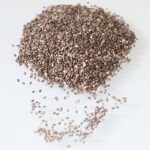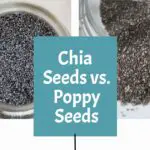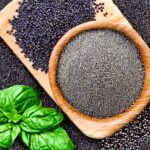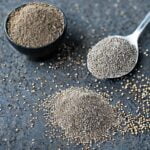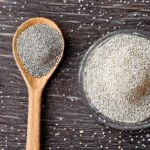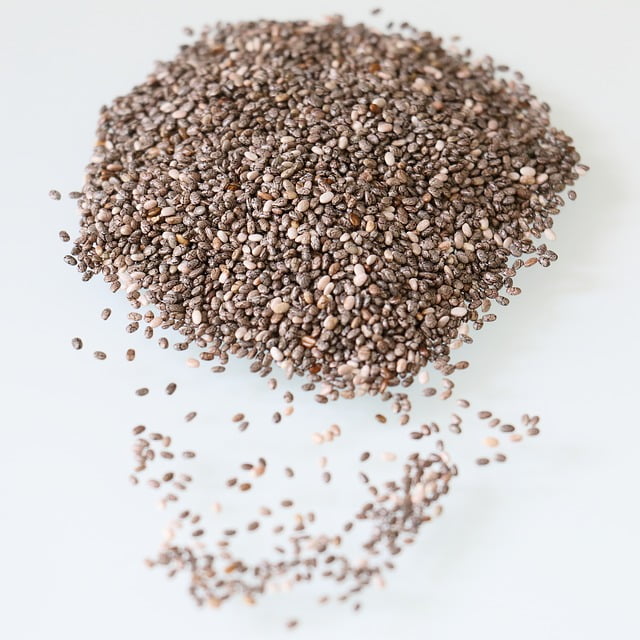
Many people have heard of chia seeds but didn’t know all the potential benefits they have to offer. Along with those benefits, however, are there any side effects to be concerned about?
In this post, we will look at the top 10 benefits of chia seeds, along with the top side effects of chia seeds. (For an even more in-depth look, see 35+ Chia Seeds Benefits – For Health, Skin & Hair)
Top Chia Seeds Benefits
Chia seeds are small, round seeds that come from the Salvia hispanica plant, which is native to Mexico and Central America. They have become increasingly popular in recent years due to their high nutrient content and potential health benefits.
They are packed with nutrition, meaning you can start with as little as just a teaspoon of chia seeds every day. Here is a detailed look at some of the benefits of chia seeds:
- High in Fiber: Chia seeds are an excellent source of dietary fiber. They contain both soluble and insoluble fiber, which can help to promote regular bowel movements and relieve constipation. The high fiber content in chia seeds can also help to reduce the risk of diverticulitis, a condition characterized by small pouches in the colon wall. Additionally, consuming chia seeds can also help to lower cholesterol levels and improve glucose control. (Chia Seeds Benefits for Your Stomach and Digestion)
- Rich in Omega-3 Fatty Acids: Chia seeds are one of the best plant-based sources of omega-3 fatty acids. These essential fatty acids are important for heart health, brain function, and reducing inflammation in the body. Omega-3 fatty acids can help to lower blood pressure, decrease the risk of heart disease, and improve brain health. (Omega-3s in Chia Seeds)
- High in Antioxidants: Chia seeds are also a good source of antioxidants, which can help to protect the body from damage caused by free radicals. These antioxidants can also help to reduce the risk of certain types of cancer. Antioxidants are important for maintaining good health and preventing disease.
- May aid in weight loss: Chia seeds are low in calories and high in fiber, which can help to promote feelings of fullness and reduce overall calorie intake. This can aid in weight loss and weight management. Also, they provide a feeling of satiety which can help in reducing the overall food intake. (See How Much Chia Seeds Per Day for Weight Loss)
- Gluten-free: Chia seeds are gluten-free, which can be beneficial for those with celiac disease or gluten intolerance.
- Easy to Incorporate in Diet: Chia seeds are easy to incorporate in the diet as they can be added to smoothies, yogurt, oatmeal, or even used as an egg replacement in baking. They can also be mixed with water to make a gel-like substance, which can be used as a thickener in sauces or soups. (See How to Eat Chia Seeds – 12 Ways)
- May improve bone health: Chia seeds are a good source of calcium, which is important for maintaining strong bones. Additionally, they contain other minerals such as phosphorus and magnesium that are also important for bone health.
- May improve cardiovascular health: Chia seeds contain compounds such as alpha-linolenic acid, fiber, and antioxidants, which can help to improve cardiovascular health. These compounds can help to lower blood pressure, reduce inflammation, and decrease the risk of heart disease.
- May improve skin health: The high antioxidant content in chia seeds can help to protect the skin from damage caused by free radicals. This can help to reduce the appearance of wrinkles, fine lines, and age spots. Additionally, the omega-3 fatty acids in chia seeds can help to improve skin hydration and elasticity. (See Benefits of Chia Seeds for Your Skin)
- May improve athletic performance: Chia seeds are a good source of energy, and they can help to improve athletic performance. They can help to provide sustained energy during prolonged exercise and may help to reduce muscle soreness after intense exercise.
As we see, chia seeds are a nutritious food that can offer a wide range of health benefits. They are an excellent source of dietary fiber, omega-3 fatty acids, antioxidants, gluten-free, and easy to incorporate into the diet. They may aid in weight loss, improve bone health, cardiovascular health, skin health, and athletic performance.
(See also Benefits of Chia Seeds for Women)
Top Chia Seeds Side Effects
Chia seeds are a popular health food that is known for their high nutrient content and potential health benefits. Chia seeds are generally considered safe to consume.
However, like any food, consuming chia seeds in excessive amounts or not being mindful of how they’re consumed can result in some side effects. Below are some of the potential side effects of consuming chia seeds:
- Digestive Discomfort: Consuming too many chia seeds can cause digestive discomforts such as bloating, gas, and stomach cramps. This is because chia seeds are high in fiber and can absorb up to 12 times their weight in water, which can cause digestive issues if not consumed with enough water.
- Interference with the absorption of minerals: Chia seeds contain compounds called phytates, which can bind to minerals such as calcium, iron, and zinc, making them less bioavailable for the body. This can be a concern for people with mineral deficiencies or at risk for them.
- Interaction with Medications: Chia seeds may interact with blood-thinning medications such as warfarin. The high levels of omega-3 fatty acids in chia seeds can increase the risk of bleeding when taken in combination with these medications. It is important to consult with a healthcare professional before consuming chia seeds if you are taking any medications.
- Allergic Reactions: Some people may be allergic to chia seeds. Symptoms of an allergic reaction can include hives, itching, and difficulty breathing. If you experience any of these symptoms after consuming chia seeds, it is important to stop consuming them and seek medical attention.
- May cause constipation: Chia seeds absorb a large amount of liquid, so if not consumed with enough water, they may cause constipation. If you experience constipation after consuming chia seeds, it is important to increase your water intake and reduce your consumption of chia seeds.
- Pregnancy and breastfeeding: Pregnant and breastfeeding women should consult their healthcare provider before consuming chia seeds, as there is limited research on their safety during these times. (See Chia Seeds Side Effects in Females)
- May worsen symptoms of IBS: Chia seeds may worsen symptoms of irritable bowel syndrome (IBS) such as bloating, cramping and constipation.
- May affect blood sugar levels: Chia seeds have a high amount of carbohydrates, which can raise blood sugar levels in people with diabetes or at risk of diabetes. They should consume chia seeds in moderation and monitor their blood sugar levels closely.
- May affect thyroid function: Chia seeds contain compounds called goitrogens, which can interfere with thyroid function in some people. This may be a concern for people with pre-existing thyroid conditions or at risk for them.
Chia seeds are a nutritious food that can offer a wide range of health benefits, but consuming them in excessive amounts or not being mindful of how they’re consumed can result in some side effects. (See Dangers of Eating Chia Seeds)
People who are pregnant, breastfeeding, have a history of allergies, on medication, or have a pre-existing health condition should consult with a healthcare professional before consuming chia seeds.
Additionally, it is important to consume chia seeds in moderation and drink enough water to avoid digestive discomfort, constipation, and interference with the absorption of minerals. People with diabetes or at risk of diabetes should monitor their blood sugar levels closely and consult with a healthcare professional.
Lance has been passionate about the plant-based diet and we have been following a whole food plant-based diet for over 5 years. We focus on health, natural healing, weight management, animal rights, and the health of the planet and environment by focusing on whole plant-based foods and sustainable practices.
Learn more at the About Me page and follow on social media at the links below.

